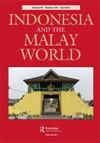对当代印尼逊尼派宗派主义的理解
IF 0.9
3区 社会学
0 ASIAN STUDIES
引用次数: 11
摘要
近二十年来,穆斯林国家的逊尼派-什叶派教派冲突愈演愈烈;印度尼西亚是世界上最大的穆斯林占多数的国家,也不例外。虽然受地缘政治动态影响的宗派话语在当地宗派冲突中受到许多经文团体的催化,但以Nahdlatul Ulama (NU)为代表的传统伊斯兰教被排除在宗派主义的学术分析之外,因为它在很大程度上被认为是宽容伊斯兰教的代表。但是,民联的神职人员在东爪哇挑起了一系列的宗派事件。这促使我们重新审视NU多样性更复杂的本质。为什么不宽容的kiai会出现在NU,是什么促使他们参与宗派主义,他们是谁?我在这里认为,宗派反什叶派情绪的出现是为了使伊斯兰联盟多元化领导人失去合法性,并增强该组织内外的影响力。具体来说,我探讨了反什叶派努派人物的崛起,他们通过作为萨伊德·穆罕默德·阿拉维·马利基(1944-2004)的追随者这一共性而发展出了一种特别牢固的联系。马利基是一位来自沙特阿拉伯麦加的神职人员。他是NU成员中非常受尊敬的乌拉玛。虽然他宣称宽容的重要性,并避免谴责任何人为非信徒(卡菲尔),包括什叶派,但他的一些门徒越来越多地参与宗派主义,以便在印度尼西亚的选举民主中寻求影响力。本文章由计算机程序翻译,如有差异,请以英文原文为准。
Understanding Sunni-Shi’a sectarianism in contemporary Indonesia
ABSTRACT The Sunni-Shi’a sectarian conflicts in Muslim countries have intensified during the last two decades; Indonesia, the largest Muslim-majority country in the world, is no exception to this trend. While sectarian discourses influenced by geopolitical dynamics are catalysed by many scripturalist groups in local sectarian conflicts, the traditional Islam represented by Nahdlatul Ulama (NU) is left out from the scholarly analysis on sectarianism as it has been largely considered representative of tolerant Islam. However, a series of sectarian incidents have been provoked by NU clerics in East Java. This urges us to re-examine the more complex nature of NU’s diversity. Why have intolerant kiai emerged from NU, what motivates them to engage in sectarianism, and who are they? I argue here that sectarian anti-Shi’a sentiments emerged as an attempt to delegitimise NU pluralist leaders and enhance the influence both within and outside the organization. Specifically, I explore the rise of anti-Shi’a NU figures who have developed a particularly strong bond through their commonality as followers of Sayyid Muhammad Alawi al-Maliki (1944–2004), a cleric from Mecca, Saudi Arabia. He was an exceptionally well respected ulama among NU members. Although he proclaimed the importance of tolerance, and refrained from denouncing any one as a non-believer (kafir) including the Shi’a, some of his disciples are increasingly engaging in sectarianism in order to seek influence in Indonesia’s electoral democracy.
求助全文
通过发布文献求助,成功后即可免费获取论文全文。
去求助
来源期刊

Indonesia and the Malay World
ASIAN STUDIES-
CiteScore
2.00
自引率
0.00%
发文量
17
期刊介绍:
Indonesia and the Malay World is a peer-reviewed journal that is committed to the publication of scholarship in the arts and humanities on maritime Southeast Asia. It particularly focuses on the study of the languages, literatures, art, archaeology, history, religion, anthropology, performing arts, cinema and tourism of the region. In addition to welcoming individual articles, it also publishes special issues focusing on a particular theme or region. The journal is published three times a year, in March, July, and November.
 求助内容:
求助内容: 应助结果提醒方式:
应助结果提醒方式:


